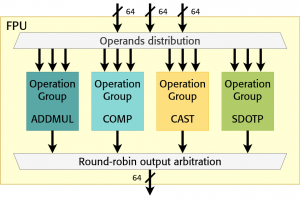Hardware Exploration of Shared-Exponent MiniFloats (M)
From iis-projects
Contents
Overview
Status: Available
- Type: Master Thesis
- Professor: Prof. Dr. L. Benini
- Supervisors:
Introduction
Low-precision floating-point (FP) formats are getting more and more traction in the context of neural network (NN) training. Employing low-precision formats, such as 8-bit FP data types, reduces the model's memory footprint and opens new opportunities to increase the system's energy efficiency. While many commercial platforms already provide support for 8-bit FP data types, introducing lower-than-8bit formats is key to facing the memory footprint and efficiency requirements that ever-larger NN models introduce.
FP unit (FPU) developed at IIS [1], [2] already provide hardware support for low-precision FP formats (down to 8 bits). The goal of this project is to explore less-than-8b FP formats with a particular emphasis on shared-exponent MiniFloats [3]. Such formats use a shared exponent for N less-than-8bit values and are currently being researched by many hardware providers [3].
Character
- 20% Literature / architecture review
- 40% RTL implementation
- 40% Evaluation
Prerequisites
- Strong interest in computer architecture
- Experience with digital design in SystemVerilog as taught in VLSI I
- Experience with ASIC implementation flow (synthesis) as taught in VLSI II
References
[1] https://arxiv.org/abs/2207.03192 MiniFloat-NN and ExSdotp: An ISA Extension and a Modular Open Hardware Unit for Low-Precision Training on RISC-V cores
